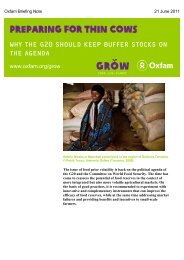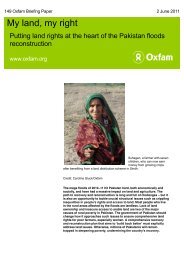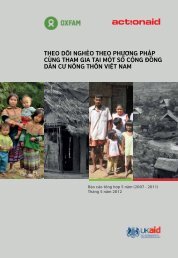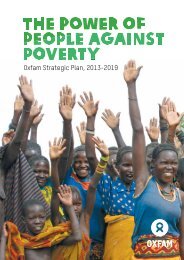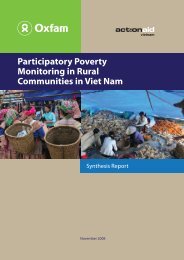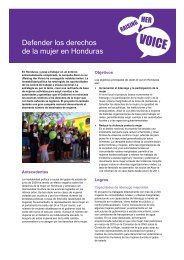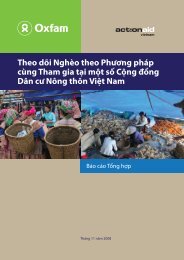Challenges to Rural Poverty Reduction in Viet Nam - Oxfam Blogs
Challenges to Rural Poverty Reduction in Viet Nam - Oxfam Blogs
Challenges to Rural Poverty Reduction in Viet Nam - Oxfam Blogs
Create successful ePaper yourself
Turn your PDF publications into a flip-book with our unique Google optimized e-Paper software.
Participa<strong>to</strong>ry poverty moni<strong>to</strong>r<strong>in</strong>g <strong>in</strong> rural communities <strong>in</strong> <strong>Viet</strong> <strong>Nam</strong><br />
56<br />
head of the credit groups. They also serve as a focal po<strong>in</strong>t, provid<strong>in</strong>g feedback <strong>to</strong> the<br />
commune and welcom<strong>in</strong>g visi<strong>to</strong>rs. In mounta<strong>in</strong>ous ethnic m<strong>in</strong>ority communes, village<br />
heads are also heads of some mass organizations. Most village heads feel they have a<br />
very heavy work load, and are sometimes forced <strong>to</strong> neglect household chores.<br />
Allowances for village heads are low. Allowances for village heads at most moni<strong>to</strong>r<strong>in</strong>g<br />
po<strong>in</strong>ts <strong>in</strong>creased <strong>in</strong> early 2011 and range between 60% and 100% of the m<strong>in</strong>imum wage<br />
(830,000 VND per month <strong>in</strong> late 2011) depend<strong>in</strong>g on the prov<strong>in</strong>ce. Allowances only<br />
cover travel and communication costs. Many people do not want <strong>to</strong> take the position of<br />
village head because allowances are <strong>to</strong>o low.<br />
Village heads have had little opportunity <strong>to</strong> participate <strong>in</strong> comprehensive<br />
tra<strong>in</strong><strong>in</strong>g, so have limited understand<strong>in</strong>g of relevant policies. Most have completed<br />
lower or upper secondary school, although some did not complete primary school. In<br />
mounta<strong>in</strong>ous ethnic m<strong>in</strong>ority areas (Thuan Hoa-Ha Giang, Ban Lien-Lao Cai, Luong M<strong>in</strong>h-<br />
Nghe An, Xy-Quang Tri, Phuoc Dai and Phuoc Thanh-N<strong>in</strong>h Thuan), village heads have only<br />
a limited knowledge and understand<strong>in</strong>g of regulations and policies. Statistics, records<br />
and data are not kept systematically by village heads. Most village heads expressed<br />
a desire <strong>to</strong> attend more comprehensive tra<strong>in</strong><strong>in</strong>g on policies, and management skills<br />
so as <strong>to</strong> better fulfil their roles. However, there are few advanced tra<strong>in</strong><strong>in</strong>g courses on<br />
professional skills for village heads. This is a vital issue if village heads are <strong>to</strong> <strong>in</strong>crease<br />
people’s participation and empowerment.<br />
Village patriarchs<br />
Village patriarchs play an important role <strong>in</strong> mobiliz<strong>in</strong>g villagers. At present, “village<br />
patriarchs” are either “traditional” and elected accord<strong>in</strong>g long-stand<strong>in</strong>g community<br />
practices or “modern”, a result of recent Government policy 12 . An important requirement<br />
is <strong>to</strong> understand traditional cus<strong>to</strong>ms, traditions and rituals. Therefore, village patriarchs<br />
tend <strong>to</strong> be elderly people. In some villages, as cus<strong>to</strong>m and tradition plays a dim<strong>in</strong>ish<strong>in</strong>g<br />
role village “traditional patriarchs” have become less important. For modern village<br />
patriarchs, age is not considered the most important criterion. Some are young but<br />
trusted and elected by villagers (such as the one <strong>in</strong> Doi 1 village, Ban Lien-Lao Cai who is<br />
just 37 years old). The role of village patriarchs is mostly <strong>to</strong> assist the Village Management<br />
Board communicate and mobilize people <strong>to</strong> implement Government policies and local<br />
guidel<strong>in</strong>es, and resolve conflicts <strong>in</strong> the village.<br />
Farmers’ groups with community functions<br />
Groups with community functions are highly susta<strong>in</strong>able <strong>in</strong> the last five years,<br />
as they stem from direct <strong>in</strong>terests of local residents, help ma<strong>in</strong>ta<strong>in</strong> community functions<br />
which are really needed by the people, and operates on voluntary basis and consensus<br />
of members, not dependent on external f<strong>in</strong>ancial support. In fact, <strong>in</strong> surveyed sites, there<br />
are many farmers’ groups with community functions such as Community Forest Protection<br />
Group, Construction Board, Water Project Management, Community Development<br />
Club, Inter-Family Group etc. which are operational very well. These forms of <strong>in</strong>formal<br />
community cooperation may promote the participation and empowerment of villagers<br />
<strong>in</strong> the implementation of policies, programmes, and projects as appropriate <strong>to</strong> local<br />
cus<strong>to</strong>ms, practices, and socio-economic conditions. The development of operational<br />
regulations which are clear and b<strong>in</strong>d<strong>in</strong>g responsibilities among members also help the<br />
groups <strong>to</strong> operate more effectively.<br />
12 Accord<strong>in</strong>g <strong>to</strong> Instruction 06/2008/CT-TTg dated 1 February 2008 of the Prime M<strong>in</strong>ister on promot<strong>in</strong>g the<br />
roles of the respectful people <strong>in</strong> ethnic m<strong>in</strong>ority areas. Each village can elect one “respectful person” (so called<br />
“patriarch”).



